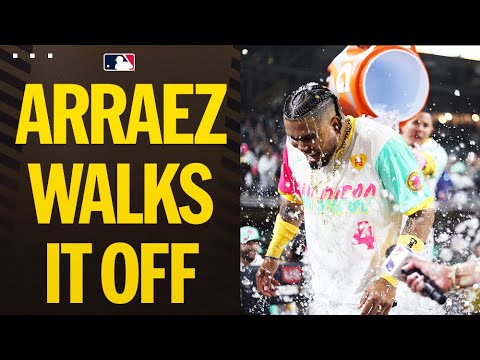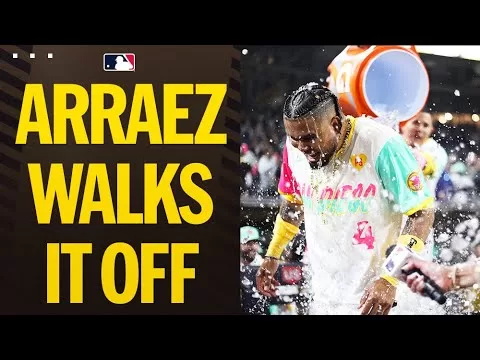Really, though, it was the team’s own lack of production at the plate that proved fatal, costing them in front of a split crowd of 43,338 that manager Dave Roberts compared to an October environment.
“I don’t talk about playoff atmosphere too often in the regular season,” Roberts said. “But today was. It felt like that.”
Given his team’s recent postseason fortunes, the result also felt like some October deja vu.
The Dodgers struggled early to adapt to the large strike zone of plate umpire Mike Estabrook (who, in fairness, granted some generous calls to Dodgers pitchers as well).

“I think early on our guys were starting to wonder what was a strike, what wasn’t,” Roberts said.
They were flummoxed the whole night by Padres starter Michael King, who dialed up 11 strikeouts in a scoreless seven-inning start.
“[The strike zone] wasn’t the reason Michael King was good tonight,” Roberts said.
“He was putting the ball where he wanted,” first baseman Freddie Freeman added. “Sometimes that happens.”
Still, in the end, the Dodgers really had only themselves to blame.
Their starter, Tyler Glasnow, provided another strong outing, giving up only one run (a Luis Campusano third-inning home run) while striking out 10 over seven innings to lower his ERA to 2.53.
Their lineup also outproduced San Diego, recording four hits and four walks to San Diego’s three hits and two walks.
Yet, in their fourth loss out of six games against the Padres this season, the Dodgers still couldn’t find a way to prevail, ending the seven-game winning streak the team was carrying into this week’s trip.
Dodgers starting pitcher Tyler Glasnow delivers during the first inning Friday.
(Gregory Bull / Associated Press)
“Just as an offense,” Freeman said, “I wish we would’ve scored more runs for [Glasnow] today.”
The Dodgers (26-14) did have one chance to flip the script, when they put runners on second and third with no outs while trailing 1-0 in the eighth inning. However, they managed only one run from the opportunity — a Freeman sacrifice fly — and went hitless in four at-bats on the night with runners in scoring position.
That set the stage for the ninth inning, when Campusano tagged reliever Michael Grove for a leadoff double before Arráez ended it with a line drive to center.
“I just felt that, if we could pitch Arraez carefully, we get a chance to get to [the on-deck hitter, Fernando] Tatis,” Roberts said, explaining why he didn’t intentionally walk Arráez — the reigning National League batting champion San Diego acquired from Miami in a trade last week — even with a base open. “You kind of pick your poison right there. Just didn’t work out.”
The lack of offense also highlighted some of the depth concerns at the bottom of the Dodgers’ lineup — an area of particular roster intrigue as outfielder Jason Heyward nears his return from a back injury.
On Friday, Heyward took live at-bats for the first time since going on the injured list a month ago. He will go through two more sessions Saturday and Monday, then begin a rehabilitation assignment at some point next week.
That means, with his return probably coming at some point this month, the Dodgers will have to start evaluating who on the current roster could make way for Heyward’s eventual return.
Andy Pages originally looked like a temporary replacement. But he has quickly turned a two-way big league ticket into an apparent one-way destination, unlikely to be sent down given his .300 batting average and .850 OPS.
Gavin Lux (.183 average) and Kiké Hernández (.211) struggled out of the gate but have shown signs of life recently.
That leaves outfielder James Outman and utility man Chris Taylor as the two logical candidates, at present, where a roster change could be made.
Outman went hitless with a strikeout in three at-bats Friday, dropping his season batting average to .158 while keeping his strikeout rate above 30%.
“I’m just trying to be more on time and more ready to hit,” Outman said, noting his focus right now is more on approach, not mechanics. “You just need to get in the box the next day and hit. There’s a lot to it — but there’s not much to it.”
Dodgers star Shohei Ohtani reacts after striking out during the first inning Friday.
(Gregory Bull / Associated Press)
Taylor, stunningly, has been even worse. He is just four for 56 with 28 strikeouts, compiling the team’s highest strikeout rate (41.2%) and posting the lowest batting average in the majors (.071) among hitters with at least 50 at-bats.
Another unsettling stat that illustrates Taylor’s woeful start: Despite having the second fewest at-bats on the team, ahead of only catcher Austin Barnes, he has already accumulated almost one whole win below replacement, according to Baseball Reference.
“There’s been a lot of times where I’ve felt right there,” Taylor said recently, blaming some of his struggles on a failed offseason swing change. “And I just haven’t been able to get over the hump.”
The big difference between Taylor and Outman is their contracts.
Outman is a second-year player who can be optioned to the minors. Taylor has two years (including this one) and almost $30 million left on the free-agent deal he signed after his lone All-Star season in 2021.
In other words, while Outman has been marginally better than Taylor, he is also the easier player to move off the MLB roster — particularly for a Dodgers team with little proven position player depth in the minors.
As Roberts has noted repeatedly in recent days, the club isn’t making any final decisions yet. They still have some time until Heyward returns. There are still plenty of games for roster circumstances to change.
“Like with anything, you just don’t know how it’s gonna play out,” Roberts said.
Yet, the manager added, ominously, “I think you have to look at a couple different options.”
The need to do so became clear again Friday, on one of the rare nights of late the Dodgers failed to get their bats going.

